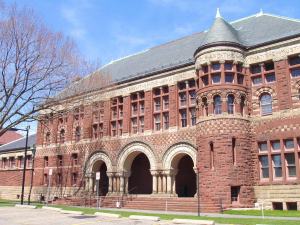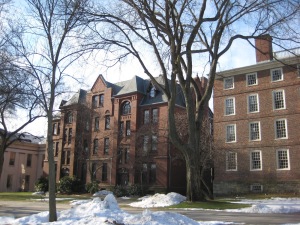Ivy League
A brand name that equates prestigious universities in the Northeast, and the nation:
– Harvard, Yale & Princeton University
The Big Three, also known as the Holy Trinity, is a historical term used in the United States to refer to Harvard, Yale, and Princeton. The phrase Big Three originated in the 1880s, when these three colleges dominated college football.High schools’ college admissions counselors and colleges’ admissions guides sometimes use the initial-ism HYP to refer to these colleges.
Brown University is a leading Ivy League institution with a distinctive undergraduate academic program, a world-class faculty, outstanding graduate and medical students, and a tradition of innovative and rigorous multidisciplinary study. A commitment to diversity and intellectual freedom has remained a hallmark of the University since its establishment.
Brown students are distinguished by their academic excellence, self-direction, and collaborative style of learning. Brown faculty are deeply committed to teaching, preeminent in their fields, and leaders in advancing knowledge that has broad scholarly, theoretical, and practical applications.
Columbia University is one of the world’s most important centers of research and at the same time a distinctive and distinguished learning environment for undergraduates and graduate students in many scholarly and professional fields. The University recognizes the importance of its location in New York City and seeks to link its research and teaching to the vast resources of a great metropolis. It seeks to attract a diverse and international faculty and student body, to support research and teaching on global issues, and to create academic relationships with many countries and regions. It expects all areas of the university to advance knowledge and learning at the highest level and to convey the products of its efforts to the world.
Once called “the first American university” by educational historian Frederick Rudolph, Cornell University represents a distinctive mix of eminent scholarship and democratic ideals. Adding practical subjects to the classics and admitting qualified students regardless of nationality, race, social circumstance, gender, or religion was quite a departure when Cornell was founded in 1865.
Today’s Cornell reflects this heritage of egalitarian excellence. It is home to the nation’s first colleges devoted to hotel administration, industrial and labor relations, and veterinary medicine. Both a private university and the land-grant institution of New York State, Cornell University is the most educationally diverse member of the Ivy League.
Dartmouth, a member of the Ivy League, is a private, four-year, coeducational undergraduate college with graduate schools of business, engineering and medicine and 16 graduate programs in the arts and sciences. Dartmouth is the nation’s ninth-oldest college, founded in 1769 by Rev. Eleazar Wheelock for the education of “youth of the Indian Tribes … English Youth and others …”
Dartmouth’s unique blending of a world-class research university’s resources with a college’s focus on undergraduate education offers small classes, top-flight facilities, and an outstanding faculty. Professors here are among the leaders in their fields yet remain committed to teaching. Students have the opportunity to take advantage of faculty accessibility throughout their Dartmouth careers, and Dartmouth’s strong graduate programs in the arts and sciences allow faculty to further enrich the students’ learning experience by offering direct involvement in cutting-edge research.
For more than two centuries, the University of Pennsylvania has been committed to excellence in scholarship, research and service. From its highly regarded undergraduate, graduate and professional schools to its wide-ranging program of interdisciplinary research and scholarship, Penn takes pride in being a place where students and faculty can pursue knowledge without boundaries, a place where theory and practice combine to produce a better understanding of our world and ourselves.





